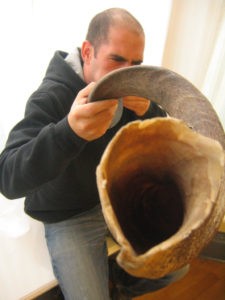 This is a guest post by Rabbi Michael Adam Latz of Shir Tikvah in Minneapolis, and the fourth in TC Jewfolk’s series of excerpts from local High Holiday Divrei Torah.
This is a guest post by Rabbi Michael Adam Latz of Shir Tikvah in Minneapolis, and the fourth in TC Jewfolk’s series of excerpts from local High Holiday Divrei Torah.
T’ka b’shofar gadol l’cheiruteinu, v’sa neis gadol la-ashukeinu, v’kol dror yishama b’arba kanfot ha-aretz. T’ku va-chodesh shofar, ba-keseh l’yom chageinu.
Sound the great shofar to proclaim our freedom, raise a great banner for our oppressed and let the voice of liberty be heard in the four corners of the earth. Sound the shofar in the seventh month, at the beginning of our renewal festival.
The hour of the New Year is upon us. Each year, at this moment, Eternity calls forth three angels to different places in the world. Shofar in hand, they set out on their journey.
The first arrives at the shores of the sea. Tekiah she is called. Her name flows off the tongue like a ballad. Tekiah. Her job is to awaken. She might have an inflated ego with the last name G’dolah—the great one—but she is resolutely humble, uncomplicated, some might say, melodious.
Next is Shevarim, who limps along, his foot broken during that hurried night they fled Egypt. He carries the shattered remnants of slavery and torture inside. You cannot see his wounds, though they consume every twisted sinewy knot of his body. But brokenness fails to stop him. He is gritty and unsentimental, with an equanimity born from intimate sorrow.
T’ruah, the final one, finds a place in the heart of the city, on a street corner where busses screech past and workers hustle from their jobs to carpools and meetings and the gym. They race ahead blankly, expressionless; forward without soul, moving, but not feeling. T’ruah laments, “Will the shofar be sounded in the city and the people not tremble? [Amos 3:6].”
They gather beneath the faint shadows of the new moon.
In the tiny shtiebls of Poland and the Great Synagogue in Jerusalem, quietly in Russian basements and the Iraqi underground and the tented villages of the Yemenite desert and on the shores of Lake Harriet, Tekiah, Shevarim and T’ruah enjoy a moment of solitude before their work begins.
At the break of dawn, “in the seventh month, on the first day of the month, they will proclaim a day of commemoration, a sacred assembly, by the sound of the shofar [Lev. 23:23].”
In the 9th Century, the great sage Saadia Gaon offered several reasons for sounding the shofar on Rosh HaShanah. One reason suggests that the shofar sounded at Sinai; each year, we are to re-experience the piercing moment of revelation.
Another reason contends that horns are blown for the coronation of a King; Rosh HaShanah is the coronation of God as King—or Queen—in the Heavenly court.
Still another idea hearkens back to Akedat Yitzchak, the binding of Isaac. We sound the shofar to remind ourselves that it was a ram sacrificed in Isaac’s stead; that our Awesome God is compassionate and just.
There are several other reasons for sounding the shofar on Rosh HaShanah, as varied as they are evocative. The essential and most profoundly spiritual reasons we sound the shofar are to stir our conscience, to confront our past errors, and ultimately, to return to wholeness and holiness.
To stir our conscience, to confront our past errors, and ultimately, to return to wholeness and holiness.
We turn to each of them this morning, in preparation for hearing the shofar in a few moments. Listen as they lift their voices.
Tekiah is small and slight; you’d never know by looking at her that she belts out the high notes like a grand diva from Broadway; her job is to wake people from their spiritual slumber. Like anyone with purpose, she takes her job seriously.
We all live with incongruities, and Tekiah has embraced the nuance of who she is and longs to be. She is first to rise. Her lips touch the ancient horn. She breathes in and exhales. From ocean shores to mountain peaks, her stunning voice brings silent pause to the beasts of the fields and the tillers of the soil; even the wind stands at attention by her command. Tekiah!
Does that first blast of the shofar startle you? It seems that it does many of us. Why is that? It isn’t as though we’re strangers to loud noises. For who among us is not assaulted daily with the blasts of car horns, loud music, construction equipment, emergency sirens, cell phones ringing, children screaming, television blaring?
….
Read the rest of Rabbi Latz’s sermon here, on Shir Tikvah’s website.
(Photo: Wikimedia Commons)




For more information about Shofar and other Holy Temple instruments, we have written extensively on the Shofar and have three websites
hearingshofar (dot) com
shofar-sounders(dot) com